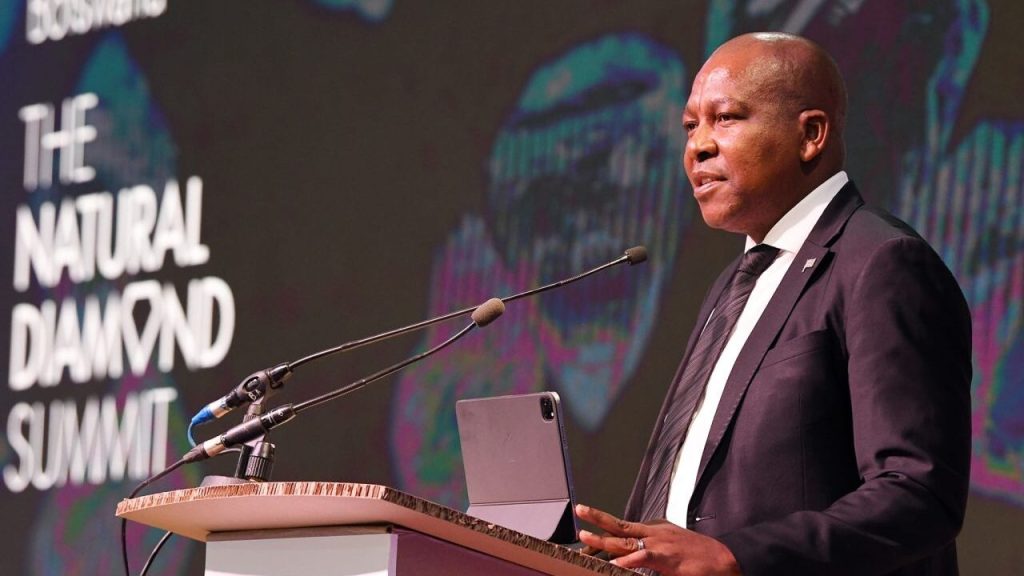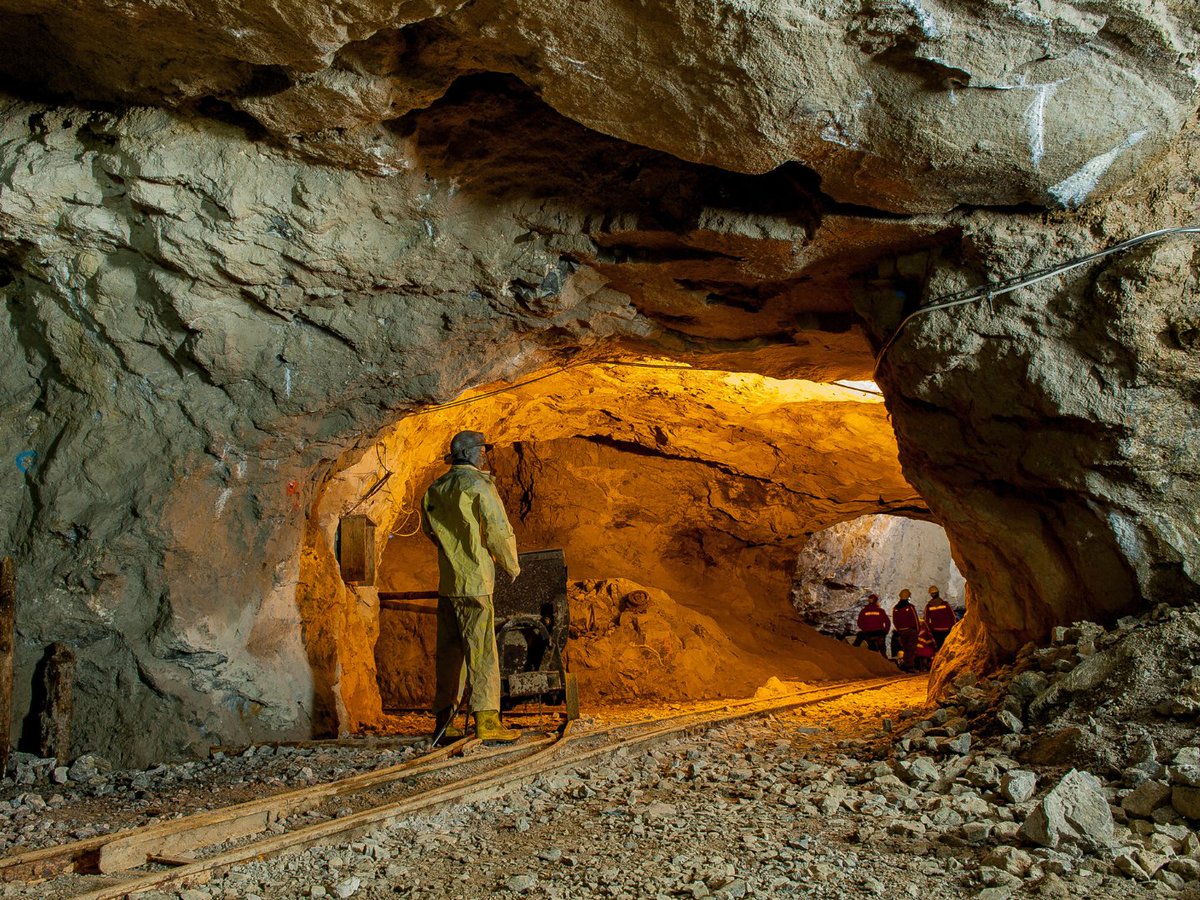
The Group of Seven (G7) import restrictions targeting Russian diamonds will have a detrimental impact on Botswana’s diamond trade and may reverse the gains the country has made in recent years, government officials told Rapaport News.
The proposal to create a single-node location through which all diamonds should pass to verify G7 compliance would be a logistical nightmare for producer countries, Lefoko Moagi, Botswana’s minister of mineral resources, green technology, and energy security, said in an interview.
“It creates added time in terms of processing our diamonds and it affects our beneficiation trajectory,” Moagi explained. “This may bring about added costs and unintended consequences that will affect the producer countries.”
In December, the G7 — which comprises Canada, France, Germany, Italy, Japan, the UK, and the US, as well as the European Union — announced new restrictions to prevent the flow of Russian diamonds to their markets. The measures include a ban on direct imports of diamonds from Russia, taking effect at the beginning of the year. From March 1, the sanctions were extended to Russian-origin diamonds polished in a third country, which prompted each G7 nation to issue interim guidelines requiring self-certification by members of the trade declaring their goods did not originate in Russia.
A blockchain-enabled traceability system will be implemented in the final stage on September 1, which the European Commission stipulated will require verification of the diamonds in Antwerp.
Systems in place
Botswana is concerned such a system will result in delays and additional costs, and consequently slow down the development of its own trade.
The government is petitioning the G7 to allow such verification to take place in the producer countries, particularly in Botswana, since it can easily adjust its processes to meet the G7 requirements, noted Emma Peloetletse, permanent secretary to the president, in a separate interview.
“Why not build on what already exists, because we have it?” she contended.
The government hosted the G7 working committee in January to demonstrate its systems and to convince the group that a local registration point can be trusted without fear of contamination by Russian goods.
“The G7 working group was shocked to see our robust systems,” Peloetletse said. “These took years of work and investment to develop.”
She expressed frustration at the lack of engagement by the G7 following the visit and that the working group didn’t have the answers to Botswana’s questions.
Risk to the economy
As a nonaligned nation, Botswana is not opposed to the sanctions, Peloetletse stressed. The country is primarily concerned about the effect their implementation will have on its diamond industry, and subsequently on the economy, she added.
Diamond mining accounts for an estimated 20% of gross domestic product (GDP), while diamond cutting, polishing, and trading makes up about 5%, according to local economist Keith Jefferis, managing director at econsult Botswana.
The domestic economy was estimated to grow 3.2% in 2023, Finance Minister Peggy Serame said in her budget speech on February 5. That represents a slowdown from 5.5% growth in 2022, reflecting “the relatively weak performance of diamond trading and mining activities throughout 2023,” she explained.
Serame projected the economy would grow 4.2% in 2024, but noted several risks that could reverse such gains. Among them are those from within the diamond industry, particularly in the beneficiation subsector, “which would be worsened by the G7 plan to verify the origin of non-Russian goods through diamond certification in Antwerp,” the minister said.
After the De Beers high
The government continues to rely on diamonds to elevate the standard of living in the country and expects its new sales agreement with De Beers, announced last June, will be a catalyst for continued economic growth.
“Diamonds are something we guard with our lives, given what it has done for Botswana and what it can still do for the country,” Moagi said. “That resonated throughout our negotiations with De Beers. There was a meeting of minds with them to reach an agreement that can really boost the economy.”
The agreement will see state-owned Okavango Diamond Company (ODC) increase its share of local production from 25% to 50% over the next decade. That will enable ODC to introduce contract sales and subsequently designate rough for beneficiation — something it has been unable to do with its current auction-only sales channels.
The government wants more diamonds to be manufactured in Botswana and views that program as a path to encourage local entrepreneurship in the diamond trade, Moagi explained. ODC is planning to include an allocation for citizens to incubate local diamond manufacturers looking to develop in the beneficiation sector, he continued.
The deal also marked the establishment of the Diamonds for Development Fund (DDF) as a way to enable entrepreneurship both within and outside the diamond industry, the minister explained.
While the De Beers agreement left the government on a high, the G7 plans burst its bubble, Peloetletse added. “Now, when we are supposed to reap what we have sowed, we get this,” she said. “It has left us very anxious about our prospects.”
African lobby
The concern is shared by other producer countries. Botswana President Mokgweetsi Masisi met with his counterparts in Angola and Namibia in late February and sent a joint letter to the G7 leaders outlining their concerns. Their sentiment was echoed by the African Diamond Producers Association (ADPA), which emphasized the negative economic consequences the G7 measures would have on the entire diamond supply chain.
“In the absence of proper consultation with African producers, it is concluded that the G7 restrictions on diamonds will disrupt the current supply chains and the fundamental business model of the diamond sector by introducing segregation requirements,” the ADPA said in its February 29 statement.
Minister Moagi is hoping for stronger engagement with the G7 decision-makers, rather than just the working committee. There is a sense that not all G7 members agree with the proposed approach to implementation, and that the African producers can leverage their position to negotiate a more practical approach, he said.
Brace for the worst
Ultimately, the African producers, and Botswana in particular, want a stronger say in how their production is handled and leveraged.
While giving license to others to tell the Botswana story, there has been a realization that those outsiders have their own agenda, Peloetletse said. “There is nobody who can tell our story better than us,” she stressed, while referencing the country’s path toward independence as a former British protectorate.
In a similar tone, Moagi stressed that from Botswana’s perspective this is more than an economic issue: “It is an assault on our democracy and the sovereignty of countries,” he cautioned. Peloetletse added that the G7 sanctions constitute just one example in which Botswana is still trying to exert its independence.
Other battles include the reclamation of land from foreign entities, after the government in November set aside BWP 1.4 billion ($102.6 million) for the acquisition of 45,000 hectares in the country’s Northeast District from British-registered Tati Company. While Tati’s status as the largest private landowner in Botswana stems from a 1911 allocation, the recent deal sparked a debate about why the country should pay such a hefty price for its own land.
The government is also engaged in a battle over its wildlife policy as European legislators attempt to ban the import of animal-trophy hunting products from the country. With the largest herd of elephants in the world, and an oversupply of game, the country must manage its ecosystem and incentivize communities to coexist with the animal population, Peloetletse explained. The government has granted the rural communities quotas for trophy hunting, arguing that banning the practice would greatly affect the livelihoods of their residents.
The convergence of these issues, and most notably the potential impact of the G7 sanctions on its diamonds, has left the government feeling uneasy and uncertain how to move forward, said Peloetletse, whose role is to advise President Masisi.
“We have to brace for the worst-case scenario because it’s not clear the G7 is willing to listen or know what it means to our economy,” she said. “Once you close the diamond tap, and the tourism tap, then we’re done, and that’s not what Botswana wants. We aspire to be a high-income country. We want to liberate ourselves.”
Source: DCLA


No comments:
Post a Comment